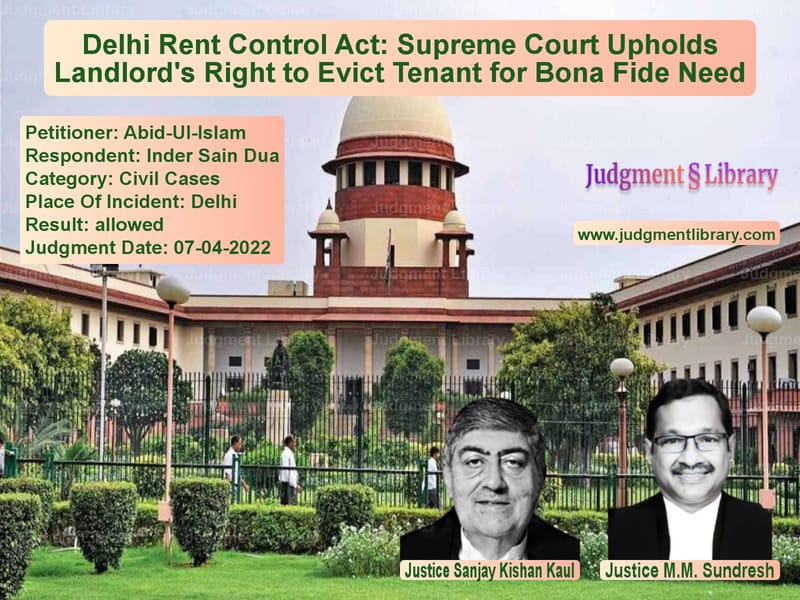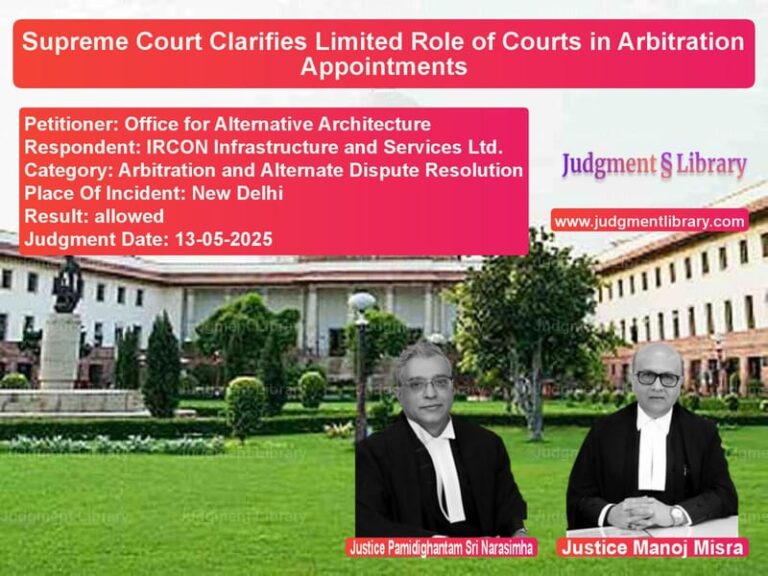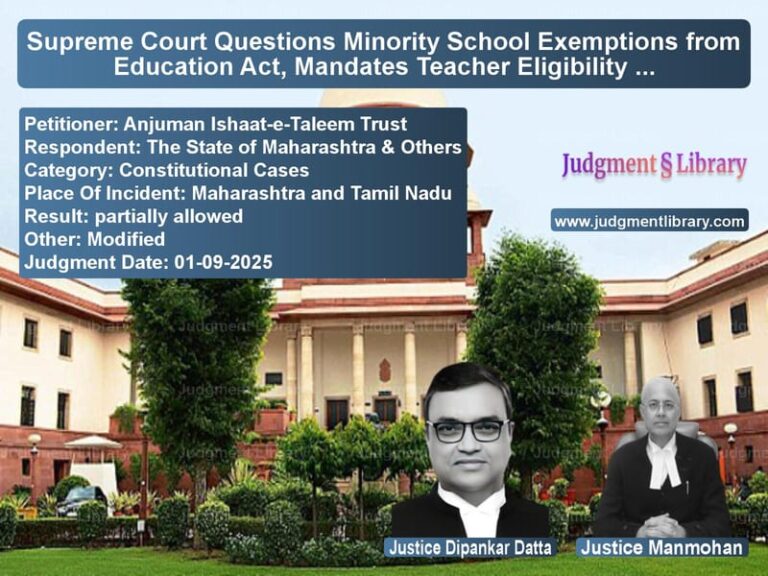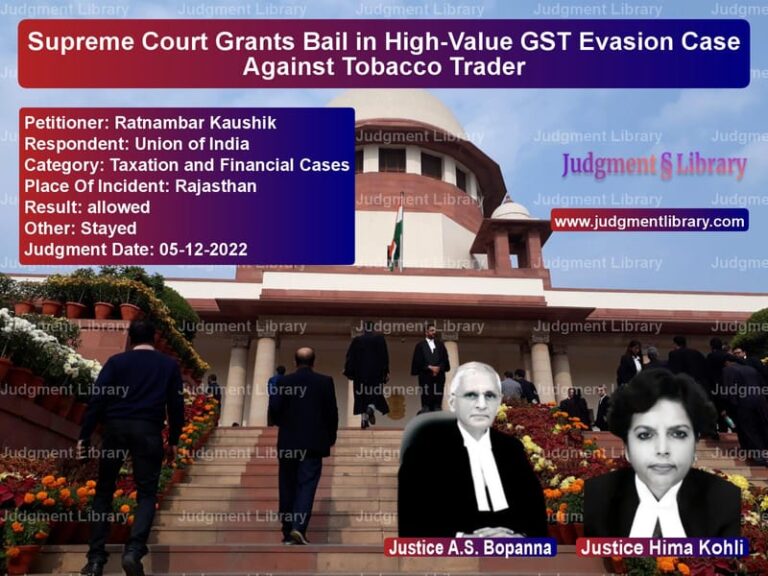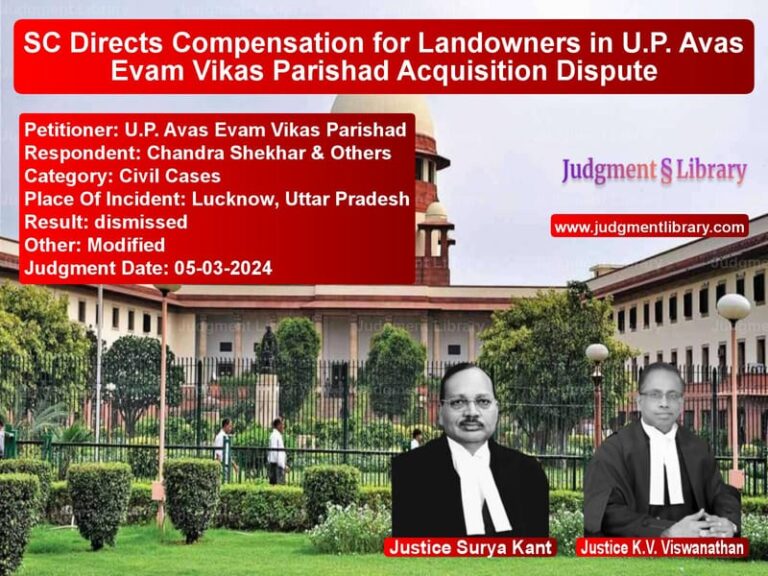Delhi Rent Control Act: Supreme Court Upholds Landlord’s Right to Evict Tenant for Bona Fide Need
The Supreme Court of India recently delivered a significant judgment in the case of Abid-Ul-Islam vs. Inder Sain Dua, addressing the scope of eviction under the Delhi Rent Control Act, 1958. The case revolved around a long-standing tenancy dispute in which the landlord sought eviction on the grounds of bona fide need. The judgment reaffirmed the limited scope of judicial review in such matters and the importance of landlord rights in eviction proceedings.
The Court held that a landlord’s requirement for premises must be evaluated based on their bona fide need, and tenants cannot dictate alternative arrangements. The ruling reversed the Delhi High Court’s order, which had granted the tenant leave to defend despite the Rent Controller rejecting their application.
Background of the Case
The dispute centered around two shops in Delhi, originally leased to the respondent, Inder Sain Dua, in 1970. Over time, ownership of the property changed hands, and the appellant, Abid-Ul-Islam, became the legal owner through inheritance and an arbitration award dated March 11, 1980.
In 2014, the appellant filed an eviction petition under Section 14(1)(e) read with Section 25B of the Delhi Rent Control Act, citing bona fide need for the premises. The tenant sought leave to defend, arguing that:
- The appellant did not have clear ownership of the property.
- The property was subject to the Enemy Property Act, 1968.
- The appellant had alternative accommodations and thus did not genuinely need the premises.
The Rent Controller rejected the tenant’s application for leave to defend, holding that the title of the appellant was not in dispute, the Enemy Property Act was inapplicable, and the tenant’s claim regarding alternative accommodations was vague.
Dissatisfied with this ruling, the tenant approached the Delhi High Court under the proviso to Section 25B(8) of the Act. The High Court allowed the revision petition, ruling that there were triable issues regarding the appellant’s alternative accommodations. This decision was then challenged before the Supreme Court.
Petitioner’s Arguments
Abid-Ul-Islam, the petitioner and landlord, argued that:
- The High Court exceeded its jurisdiction under the limited scope of revision under Section 25B(8).
- The Rent Controller’s findings were based on clear facts, and there was no reason to revisit them.
- The tenant’s claim of alternative accommodations was vague and unsupported by evidence.
- Possession of another property does not disentitle the landlord from evicting a tenant if there is a genuine need for the premises.
Respondent’s Arguments
The tenant, Inder Sain Dua, defended his case on the following grounds:
- The High Court was justified in interfering with the Rent Controller’s decision, as there were unresolved issues.
- The property had been classified as “enemy property” due to past ownership ties with individuals residing in Pakistan.
- The landlord had alternative accommodations available for running his business.
- The eviction petition was a pretext to remove the tenant rather than a genuine requirement.
Supreme Court’s Judgment
The Supreme Court, comprising Justices Sanjay Kishan Kaul and M.M. Sundresh, ruled in favor of the landlord and set aside the High Court’s decision. The key observations made by the Court were:
- Scope of Revision Under Section 25B(8): The Court held that the High Court had exceeded its jurisdiction by re-evaluating facts instead of merely reviewing the decision-making process.
- Bona Fide Need of the Landlord: The Court reaffirmed that a landlord’s claim for eviction based on personal need should not be questioned unless clear evidence suggests otherwise.
- Alternative Accommodation: The Court held that tenants cannot insist on alternative arrangements for the landlord when bona fide need is established.
- Enemy Property Act Argument: The Court dismissed the tenant’s claim that the property fell under the Enemy Property Act, noting that prior proceedings had determined it was not enemy property.
- Conduct of the Tenant: The Court criticized the tenant for making irrelevant arguments, including references to high-ranking officials, and stated that such conduct should not influence judicial decisions.
Implications of the Judgment
The ruling has significant implications for eviction cases under the Delhi Rent Control Act:
- Reinforcing Landlord Rights: The judgment upholds the principle that landlords have the right to reclaim their property if bona fide need is demonstrated.
- Limited Scope of Judicial Review: The ruling clarifies that High Courts cannot act as appellate courts in eviction cases but can only review whether the Rent Controller followed legal procedures.
- Protection Against Frivolous Defenses: The judgment discourages tenants from using baseless defenses to delay eviction proceedings.
- Strengthening the Summary Eviction Process: By emphasizing a strict standard for granting leave to defend, the Court ensures faster resolution of eviction disputes.
Conclusion
The Supreme Court’s decision in Abid-Ul-Islam vs. Inder Sain Dua is a landmark ruling that strengthens landlords’ rights under the Delhi Rent Control Act. The judgment reinforces that tenants cannot challenge eviction claims without substantial evidence and that courts must not interfere with well-reasoned decisions by Rent Controllers. By limiting judicial review and upholding the principles of bona fide need, the ruling sets a strong precedent for future eviction cases.
Petitioner Name: Abid-Ul-Islam.Respondent Name: Inder Sain Dua.Judgment By: Justice Sanjay Kishan Kaul, Justice M.M. Sundresh.Place Of Incident: Delhi.Judgment Date: 07-04-2022.
Don’t miss out on the full details! Download the complete judgment in PDF format below and gain valuable insights instantly!
Download Judgment: abid-ul-islam-vs-inder-sain-dua-supreme-court-of-india-judgment-dated-07-04-2022.pdf
Directly Download Judgment: Directly download this Judgment
See all petitions in Property Disputes
See all petitions in Landlord-Tenant Disputes
See all petitions in Specific Performance
See all petitions in Judgment by Sanjay Kishan Kaul
See all petitions in Judgment by M.M. Sundresh
See all petitions in allowed
See all petitions in supreme court of India judgments April 2022
See all petitions in 2022 judgments
See all posts in Civil Cases Category
See all allowed petitions in Civil Cases Category
See all Dismissed petitions in Civil Cases Category
See all partially allowed petitions in Civil Cases Category

